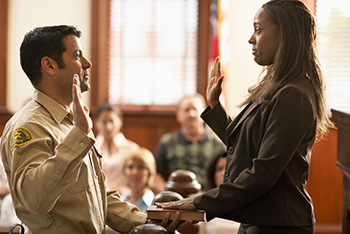 Feb. 3, 2015 – Last year, a Wisconsin Supreme Court majority (5-2) ruled that a trial court committed harmless error when it refused to let a defendant testify at trial. Now, the U.S. Supreme Court could decide whether the harmless error analysis is permitted when a defendant has been completely deprived of a constitutional right to testify.
Feb. 3, 2015 – Last year, a Wisconsin Supreme Court majority (5-2) ruled that a trial court committed harmless error when it refused to let a defendant testify at trial. Now, the U.S. Supreme Court could decide whether the harmless error analysis is permitted when a defendant has been completely deprived of a constitutional right to testify.
Angelica Nelson, through her Wisconsin public defenders, has filed a petition for writ of certiorari with the U.S. Supreme Court. Nelson, convicted on three counts of sexual assault of a child under age 16, argues that refusing her testimony was a “structural error” requiring automatic reversal. The harmless error analysis doesn’t apply, she says.
“[T]his Court has not yet decided whether a complete denial of the right to testify is amenable to harmless-error analysis,” states the petition, which the high court justices considered at conference last month, requesting the state’s response by Feb. 4.
“This case – in which a divided Wisconsin Supreme Court held that such a violation can be deemed harmless – provides an opportunity for this Court to resolve a deep split among state and federal courts on the issue,” the defense attorneys write.
Nelson, an 18-year-old with some mental limitations, was deemed competent to stand trial for having sex with a 14-year-old boy. The state introduced its evidence, including incriminating text messages, but Nelson wished to tell her side of the story.
The trial judge asked what issues or subjects she wanted to testify about. Nelson said she wasn’t going to dispute that she had sex with the young boy, but that she did not have sex with him three on consecutive days, as the state had alleged in its complaint.
Because Nelson was not challenging an element of the crime, the trial court denied her request to testify in her own defense. She was convicted on all three counts.
Nelson filed a postconviction motion, arguing that she was entitled to a new trial because the trial court deprived her of a constitutional right to testify in her own defense.
The state argued that any constitutional violation was harmless because her testimony would not have changed the outcome – she would have been convicted anyway. Nelson’s motion was denied, and a state appeals court upheld that ruling.
A 5-2 majority of the Wisconsin Supreme Court affirmed. It held that a defendant’s right to testify is subject to harmless error review and concluded that Nelson’s testimony would not have helped her – she would have conceded that she committed the crime.
For an error to be harmless, the state must prove beyond a reasonable doubt that the jury would have convicted the defendant absent the error. The dissenting justices aligned with other jurisdictions holding that a violation of the right to testify in not subject to the harmless error analysis and a violation requires an automatic reversal.
In the petition for writ of certiorari, Nelson asks the U.S. Supreme Court to resolve the split among federal and state jurisdictions on this issue. She asks the court to rule that the right to testify is a constitutional right that is never subject to harmless error review.
The petition notes that Wisconsin joined three courts of last resort and one federal court of appeals in ruling that the right to testify is amenable to harmless error review.
Meanwhile, two other state supreme courts, a federal appeals court, and two federal district courts have ruled that refusing the right to testify is an error that can never be harmless.
The petition asks the U.S. Supreme Court to resolve the jurisdictional split and require automatic reversals in cases where a defendant has been denied the right to testify.
“First, the right to testify safeguards the dignity and autonomy of the defendant – values that harmless-error analysis is not designed to evaluate,” the petition states. “Second, the harm that results from a denial of the right to testify cannot be accurately assessed.”
The National Association of Criminal Defense Lawyers and the National Association for Public defense has filed an amicus curiae brief in Nelson v. Wisconsin.
